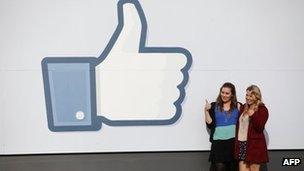Facebook and Glenstrata: Which is bubblier?
- Published
- comments

Some would argue there are two great bubbles in the world right now, in internet shares and commodities, but goodness how they manifest themselves differently on the stock market.
Today's manifestations of these phenomena are the merger talks between the mining and commodities trading groups Xstrata and Glencore, plus the announcement that Facebook will be coming to the stock market.
Both represent big deals: a merger of Xstrata and Glencore would be worth around £70bn (or $110bn), and Facebook looks set to have a market value of around £50bn (or $80bn).
So in terms of their market value, they would both be huge.
But what's under their respective bonnets could not be more different.
Glenstrata or Xcore (which sounds too much like a porn website to be a runner as moniker for the combined entity) would have revenues well over £110bn a year and after tax earnings of £6bn. So its market value would be less than the money going through its books.
As for Facebook, its revenues last year were £2.3bn or $3.7bn - which looks a lot to you and me, but is less than a twentieth of its expected market valuation. And profits after tax were a billion dollars, an eightieth of what the company is likely to be worth when shares are traded.
So one of these businesses, the commodities one, is priced at less than the value of its annual revenues and a modest multiple of profits - and the internet one is priced at a huge multiple of turnover and profits.
Now you might be tempted to conclude that Facebook is the bubble stock and Glenstrata can't possibly be.
But it is not quite as simple as that, because in the case of Glenstrata, the bubble may be in their earnings rather in the share price.
In other words, there are two different questions to be asked of Glenstrata and of Facebook.
For Glenstrata it is whether the rise in price and increases in demand for copper, iron and coal and all those other feedstocks of the still fast-growing Chinese economy can go on forever.
And for Facebook the issue is whether its turnover will continue to rise at an exponentially fast rate - basically whether it can generate ever growing revenues from its 845m monthly active users.
Or, at a time of economic stagnation in much of the rich West, you might ask yourself why all that cheap money created by central banks seems to have pumped up the price of financial assets to a disturbing extent, while doing little to stimulate job creation.